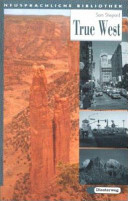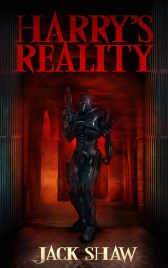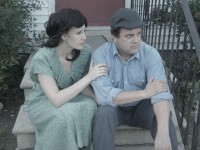Clip from the film. Instead of swimming with sharks, these real estate salesmen are vicious jackals and hyenas—feeding off each other, while moving in on each other’s kills—or leads, contracts, etc. These salesmen will do anything to close a deal. When their competitors, each other, or even contrary prey affect their ability to survive, they attack as suits them.
The Eagle Theatre’s production of GLENGARRY GLEN ROSS stunned the audience tonight and won them over with its portrayal of cutthroat, backstabbing, conspiring, conniving, lying and stealing, willing-to-do-anything real estate salesmen fighting to keep their jobs and/or avoid seeing one of their competitors walk away with an extra prize.
David Mamet’s Pulitzer Prize-winning play opened originally in London, and a year later on Broadway. Nominated for several Tony Awards, it won one. It also won several other awards, too many to mention in this forum. Later made into a film, GLENGARRY GLEN ROSS received much critical success despite the disappointing box office, proving that Mamet was not for the broader audience.
This production has it all, including rat-a-tat monologues and overlapping dialogues requiring fierce acting, raw language, weaseling, and smooth-talking characters. Naturally, violence follows when the characters are frustrated and unable to reach their goals. Director Ted Wioncek III and his ensemble cast guarantee vicious action over two days of the sales’ competition.
Intended to be a black drama, GLENGARRY GLEN ROSS is not a realistic representation of sales people today, but rather one that makes its point as each character reveals a certain primitive darkness. Hate, distrust, jealousy, worry, fear and anger abound. Congeniality, friendship and love are absent, except when someone hopes to gain an advantage.
It’s easy to see our characters reduced to scavenging, which includes a lot of positioning with claws bared, lashing out at everyone. We see the protagonists begin as a pack of wild animals, no longer able to compete in its environment. Faced with a goal that seems impossible to attain, they struggle and fight for survival. Together, they are hungry and desperate for game, feeling the pressure of being corralled, starved and desperate, knowing at least one of them most certain to die, and one shunned (fired).
The animal pacing is quick. The brutal landscape abounds with rocks, crevices and a few valleys, but never a flat field–or level playing ground. It is a mixed metaphor, I know, but it seems appropriate.
Mamet’s play raises some interesting questions as our “sales” animals roar, bark, and growl at each other.Do our characters ever recognize the consequences of their primeval behavior? It seems we, human animals, are capable of similar behavior in the face of high stakes, unfairness in the workplace, or even losing our ability to perform–to achieve as we once did.
However, when we raise the stakes too high or make achieving them impossible, do we put aside our values–our morality to gain an advantage? Are we simply predatory animals? What separates us from the beasts and makes us human? Animals in the wild avoid confrontation; they attack only when threatened in some way. When facing hostility, we return it.
How are we supposed to act when we see someone taking advantage of us or someone else? How bad does a situation have to be before we lose our veracity, our conscience or our ethics in seeking reward?
The answer is simple. There are times and situations that bring out the animal in us. Mamet, without saying it, reminds us that jackals will eat anything and hyenas have the most powerful jaws, but warns that jackals and hyenas are not as ferocious as some others are.
Lions, leopards and cheetahs will prey on jackals and hyenas if nothing easier to kill is around. Even vegetarians such as an ox or elephant can do them harm. The animal metaphor is mine, not Mamet’s, but I think the animal behaviors hold true.
The Eagle Theatre has certainly earned the name “South Jersey’s Premier Equity Theatre.” Its operation is a “class act” and a tough act for any professional theatre to follow.
Here, it again does not disappoint. From the moment you walk into the theatre you feel something big is about to happen. The bar is center stage (uh-oh, not the Wine Bar; that’s to your left as you walk into the theatre.) The Act I set background works well as bar or restaurant wallpaper, rich and elegant, but also is reminiscent of an old theatre or a circus drape.
The set was interesting and the lighting quick. The scene changes were in a total blackout, or so it seemed to the audience. The first act is shorter than the second—opposite of what you might expect—but gives the audience a perfect introduction.
The theatre company has done a remarkable job with a very tough work. David Mamet is never easy. His repetitive lines and overlapping sentences require the most talented actors. GLENGARRY GLEN ROSS is a different experience for many theatregoers.
The harsh language is appropriate in this play’s context, giving it a raw, primitive feel. Contemporary drama doesn’t get much better. It is an amazing acting feat to perform such rapid monologues with overlapping dialogues, but the cast was up to it. There was also a rhythm to the steady flow of words—the flow purposely interrupted by intense physical action like a cat lashing out.
This production’s worth the trip from wherever you live.
GLENGARRY GLEN ROSS
Written by David Mamet
Directed by Ted Wioncek III
April 25 – May 7, 2014
The Eagle Theatre
208 Vine Street – Downtown
Hammonton, NJ 08037
609-704-5012
http://theeagletheatre.com/
Originally posted by Jack Shaw for Stage Magazine.


